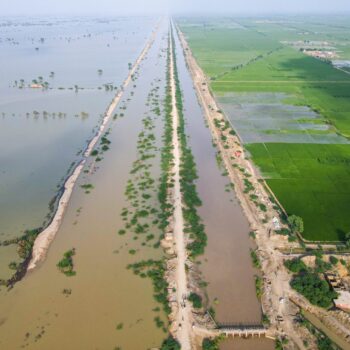A delayed global transition poses a risk to long-term financial stability. However, private capital is not being mobilised fast enough to mitigate that risk, especially for developing countries. Mobilising private investment at the scale needed to achieve the goal of $1.3 trillion annually for developing countries will require a smarter, more agile financial system.
This will need to include ensuring an international prudential framework that is forward-looking and adaptive, and reflective of the evolving risk profile of investments in emerging and developing economy assets, such as green infrastructure, and of the benefits of co-financing with multilateral development banks (MDBs) and development finance institutions (DFIs).
This policy briefing argues that central banks and international financial standard-setting bodies should better integrate climate risks into prudential policy decision-making to send strong market signals and unlock macro-critical sustainable investment into developing countries.
It makes practical recommendations focused on short- and long-term actions aimed at reforming international prudential regulation to better address climate change as a source of long-term financial instability.
Recommendation 1: Central banks, supported by the Financial Stability Board (FSB), should cooperate across borders and sectors to improve climate scenario analysis and stress testing
The FSB should build on the work undertaken in designing its analytical toolkit for assessing climate vulnerabilities to:
- Account for international and cross-sector spillover effects and understanding specific EMDE contexts;
- Support central banks in developed economies in working closely with counterparts in developing economies, across borders and sectors, to support the development of global capacity-building for scenario analysis and stress testing.
Recommendation 2: Countries should work in the short term towards longer-term goals that include strengthening the evidence base and working towards adjusting existing multilateral frameworks
Collaboration between national supervisors and regulators in the shorter term should support the achievement of longer-term goals. These goals should include:
- Ensuring that the FSB includes in its annual work programme the expansion of its work on climate-related vulnerabilities for specific EMDE contexts;
- Enabling the FSB, the International Association of Insurance Supervisors (IAIS) and national authorities to support cross-border and sector collaboration to develop scenario analysis and stress testing to properly account for the impact of climate risk on firms’ balance sheets and financial system stability and to support transition planning;
- Developing a stronger evidence base on the relative safety of green infrastructure assets, particularly within EMDEs and the inefficiencies of the design of capital charges under international prudential regulatory frameworks;
- Work towards a review of global risk weights by the FSB and a review of the Basel framework by the Basel Committee on Banking Supervision (BCBS), with areas to consider including: the potential development of a dedicated infrastructure asset class, recalibration of risk weights as they apply to projects in EMDEs, preferential treatment for green infrastructure projects, and adequate reflection of the positive credit risk effect of the presence of MDBs and public development banks (PDBs) as counterparties.
Recommendation 3: Given expected limitations on some multilateral finance forums in 2026, countries should work together through new and additional forums
In 2026, a range of additional forums should be used to progress this agenda, ensuring the continuation of the important technical work needed to support long-term reform of the international financial system. Key spaces are likely to include:
- The Circle of Finance Ministers;
- Coalition of Finance Ministers for Climate Action;
- Network for Greening the Financial System (NGFS);
- The 2026 G7 Finance Track, supported by the NGFS and the 4P Eminent Persons Group.
Read the full briefing


